Executive Summary Report on Contract Law and Vitiating Factors
VerifiedAdded on 2023/01/12
|9
|3048
|55
Report
AI Summary
This report provides an executive summary of contract law, focusing on the elements of a valid contract and the legal implications of vitiating factors. It explores key concepts such as misrepresentation, duress, and mistake, detailing how these factors can render a contract void. The summary examines relevant case studies, including L'Estrange v Graucob, Derry v Peek, Howard marine v Ogden, Barton v Armstrong, and North Ocean Shipping v Hyundai Construction, to illustrate the practical application of contract law principles. Furthermore, the report outlines the remedies available to parties affected by these vitiating factors, such as seeking damages or rescission of the contract. The report emphasizes the importance of understanding these aspects for ensuring fair and legally sound contractual agreements. It also discusses the rights of parties in relation to unfair contract terms and the implications of these terms. The content is a good resource for law students and anyone interested in understanding the fundamentals of contract law.
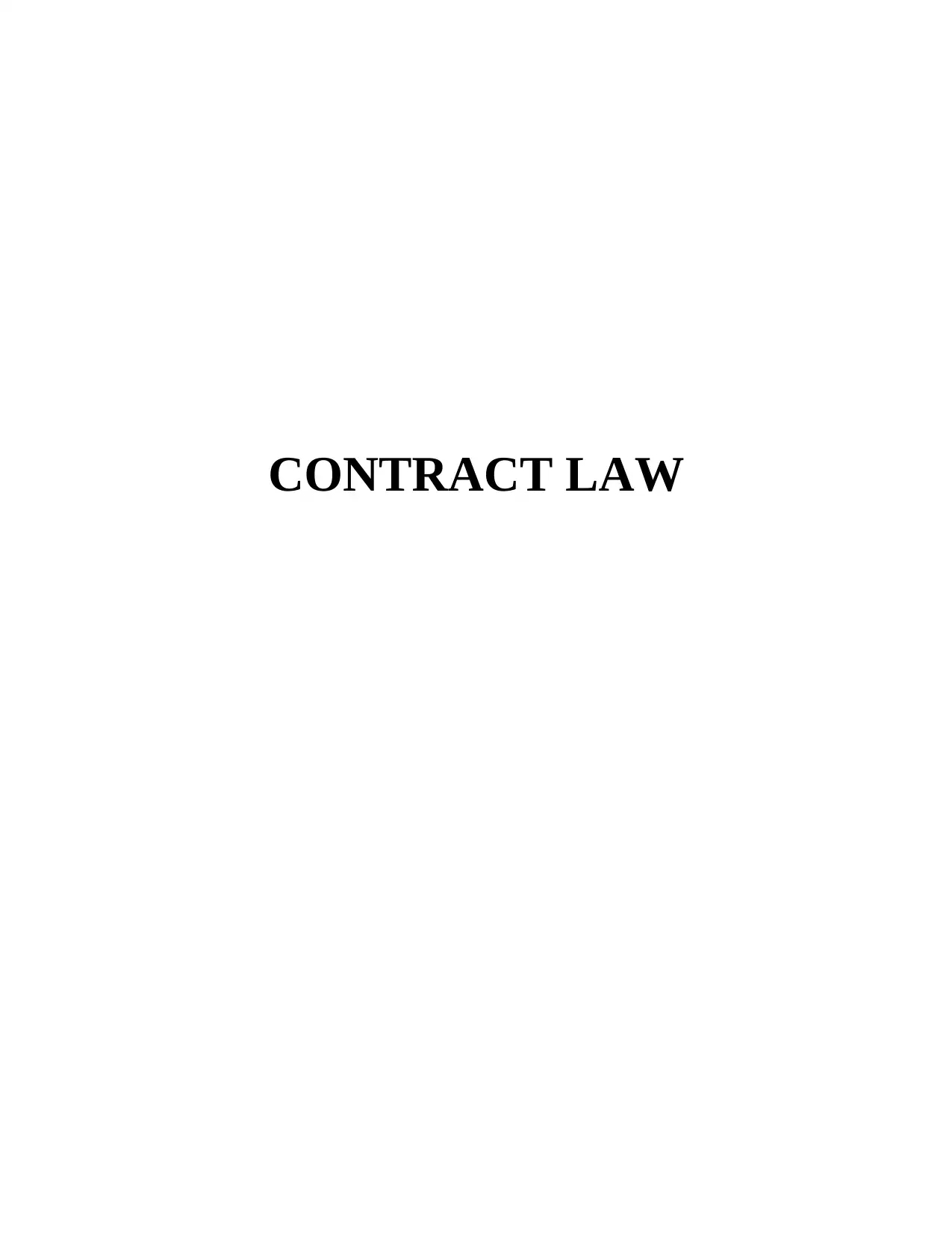
CONTRACT LAW
Paraphrase This Document
Need a fresh take? Get an instant paraphrase of this document with our AI Paraphraser
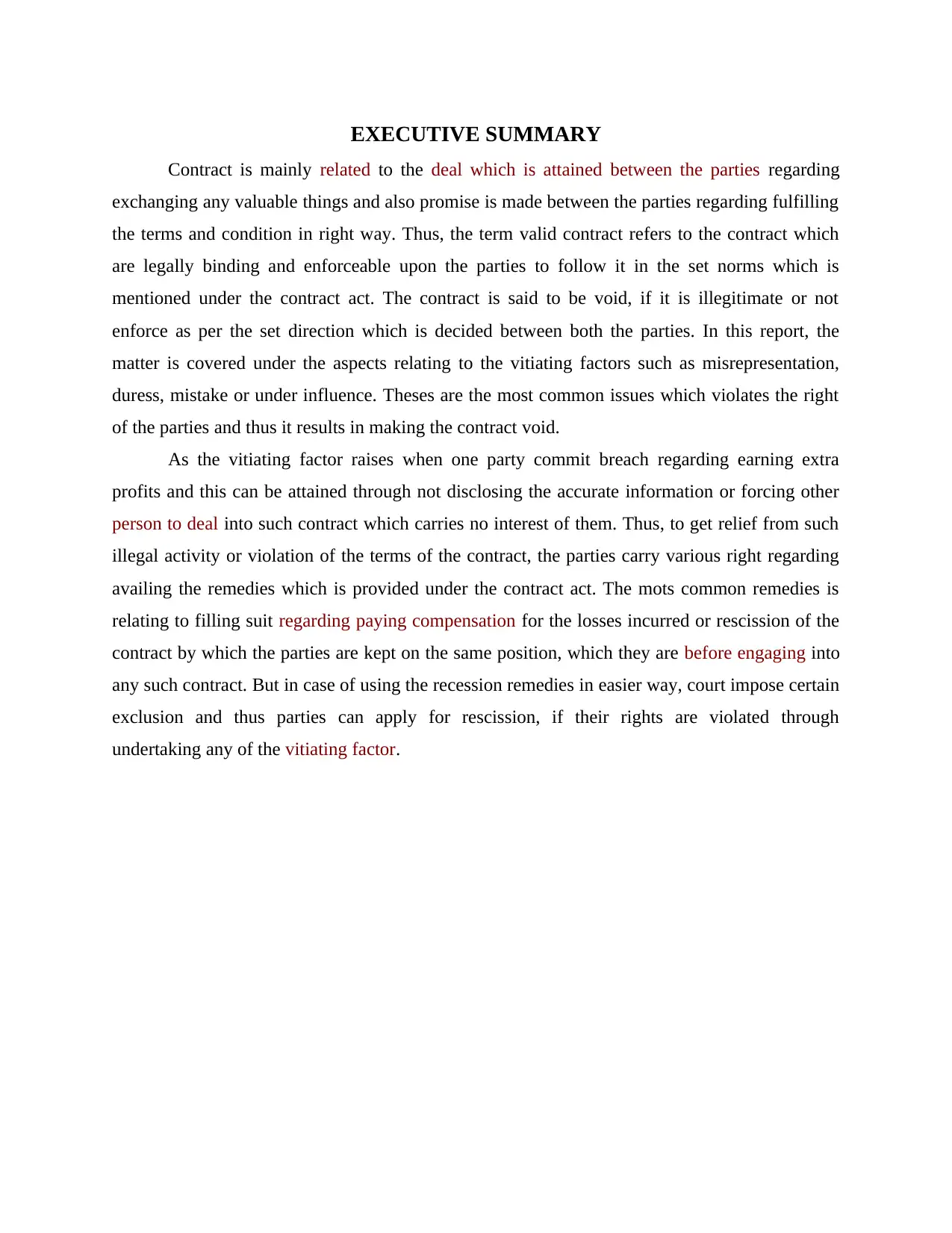
EXECUTIVE SUMMARY
Contract is mainly related to the deal which is attained between the parties regarding
exchanging any valuable things and also promise is made between the parties regarding fulfilling
the terms and condition in right way. Thus, the term valid contract refers to the contract which
are legally binding and enforceable upon the parties to follow it in the set norms which is
mentioned under the contract act. The contract is said to be void, if it is illegitimate or not
enforce as per the set direction which is decided between both the parties. In this report, the
matter is covered under the aspects relating to the vitiating factors such as misrepresentation,
duress, mistake or under influence. Theses are the most common issues which violates the right
of the parties and thus it results in making the contract void.
As the vitiating factor raises when one party commit breach regarding earning extra
profits and this can be attained through not disclosing the accurate information or forcing other
person to deal into such contract which carries no interest of them. Thus, to get relief from such
illegal activity or violation of the terms of the contract, the parties carry various right regarding
availing the remedies which is provided under the contract act. The mots common remedies is
relating to filling suit regarding paying compensation for the losses incurred or rescission of the
contract by which the parties are kept on the same position, which they are before engaging into
any such contract. But in case of using the recession remedies in easier way, court impose certain
exclusion and thus parties can apply for rescission, if their rights are violated through
undertaking any of the vitiating factor.
Contract is mainly related to the deal which is attained between the parties regarding
exchanging any valuable things and also promise is made between the parties regarding fulfilling
the terms and condition in right way. Thus, the term valid contract refers to the contract which
are legally binding and enforceable upon the parties to follow it in the set norms which is
mentioned under the contract act. The contract is said to be void, if it is illegitimate or not
enforce as per the set direction which is decided between both the parties. In this report, the
matter is covered under the aspects relating to the vitiating factors such as misrepresentation,
duress, mistake or under influence. Theses are the most common issues which violates the right
of the parties and thus it results in making the contract void.
As the vitiating factor raises when one party commit breach regarding earning extra
profits and this can be attained through not disclosing the accurate information or forcing other
person to deal into such contract which carries no interest of them. Thus, to get relief from such
illegal activity or violation of the terms of the contract, the parties carry various right regarding
availing the remedies which is provided under the contract act. The mots common remedies is
relating to filling suit regarding paying compensation for the losses incurred or rescission of the
contract by which the parties are kept on the same position, which they are before engaging into
any such contract. But in case of using the recession remedies in easier way, court impose certain
exclusion and thus parties can apply for rescission, if their rights are violated through
undertaking any of the vitiating factor.
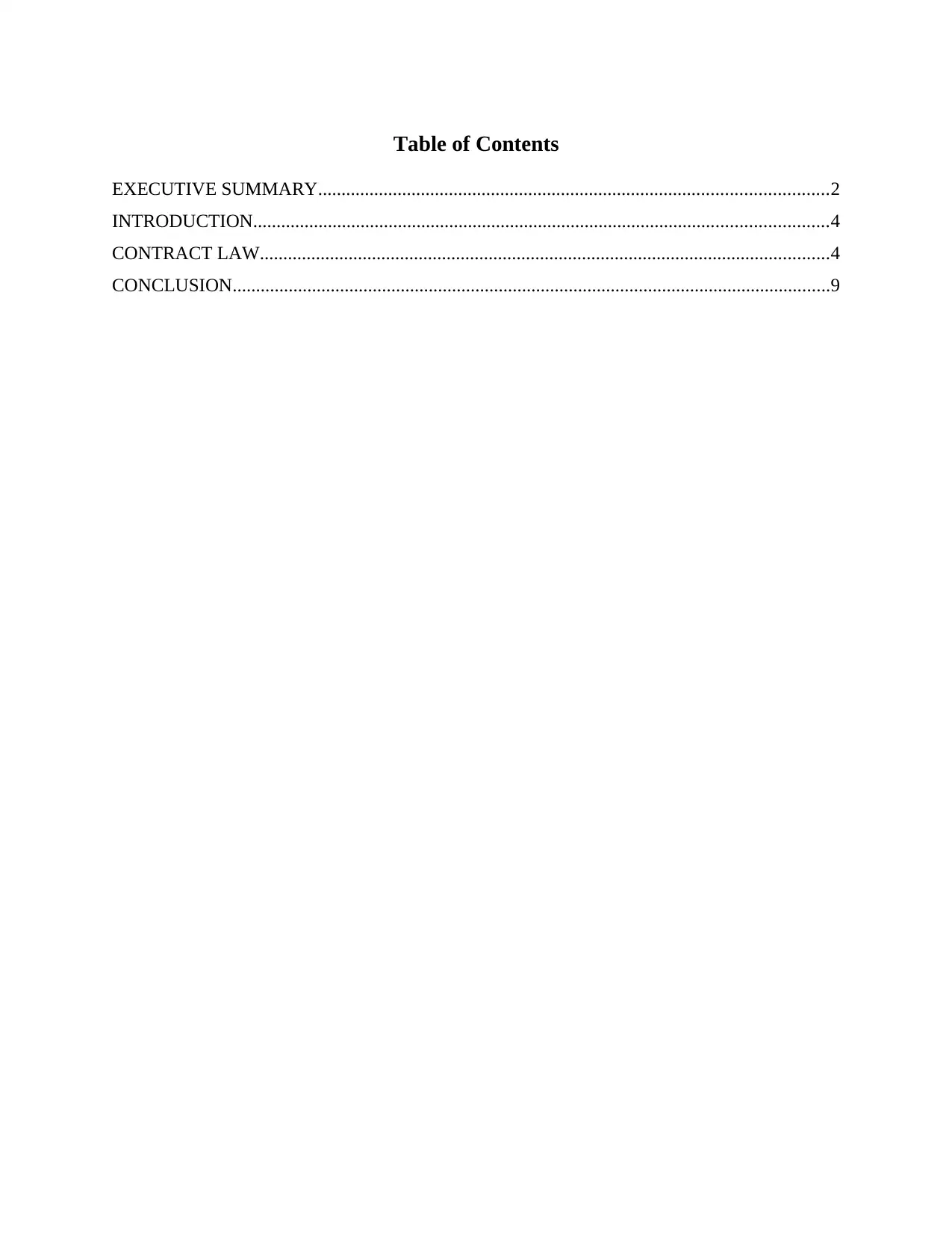
Table of Contents
EXECUTIVE SUMMARY.............................................................................................................2
INTRODUCTION...........................................................................................................................4
CONTRACT LAW..........................................................................................................................4
CONCLUSION................................................................................................................................9
EXECUTIVE SUMMARY.............................................................................................................2
INTRODUCTION...........................................................................................................................4
CONTRACT LAW..........................................................................................................................4
CONCLUSION................................................................................................................................9
⊘ This is a preview!⊘
Do you want full access?
Subscribe today to unlock all pages.

Trusted by 1+ million students worldwide
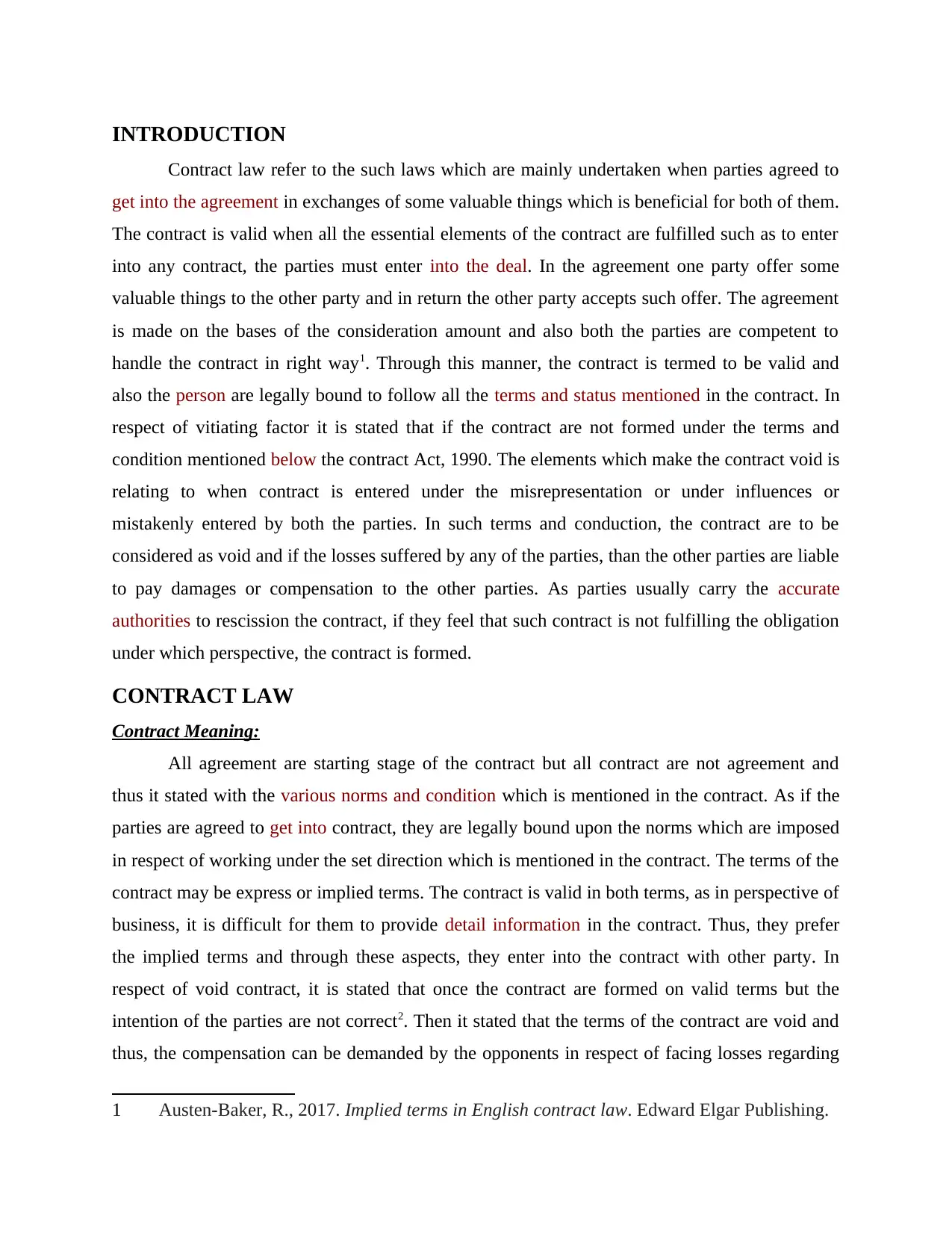
INTRODUCTION
Contract law refer to the such laws which are mainly undertaken when parties agreed to
get into the agreement in exchanges of some valuable things which is beneficial for both of them.
The contract is valid when all the essential elements of the contract are fulfilled such as to enter
into any contract, the parties must enter into the deal. In the agreement one party offer some
valuable things to the other party and in return the other party accepts such offer. The agreement
is made on the bases of the consideration amount and also both the parties are competent to
handle the contract in right way1. Through this manner, the contract is termed to be valid and
also the person are legally bound to follow all the terms and status mentioned in the contract. In
respect of vitiating factor it is stated that if the contract are not formed under the terms and
condition mentioned below the contract Act, 1990. The elements which make the contract void is
relating to when contract is entered under the misrepresentation or under influences or
mistakenly entered by both the parties. In such terms and conduction, the contract are to be
considered as void and if the losses suffered by any of the parties, than the other parties are liable
to pay damages or compensation to the other parties. As parties usually carry the accurate
authorities to rescission the contract, if they feel that such contract is not fulfilling the obligation
under which perspective, the contract is formed.
CONTRACT LAW
Contract Meaning:
All agreement are starting stage of the contract but all contract are not agreement and
thus it stated with the various norms and condition which is mentioned in the contract. As if the
parties are agreed to get into contract, they are legally bound upon the norms which are imposed
in respect of working under the set direction which is mentioned in the contract. The terms of the
contract may be express or implied terms. The contract is valid in both terms, as in perspective of
business, it is difficult for them to provide detail information in the contract. Thus, they prefer
the implied terms and through these aspects, they enter into the contract with other party. In
respect of void contract, it is stated that once the contract are formed on valid terms but the
intention of the parties are not correct2. Then it stated that the terms of the contract are void and
thus, the compensation can be demanded by the opponents in respect of facing losses regarding
1 Austen-Baker, R., 2017. Implied terms in English contract law. Edward Elgar Publishing.
Contract law refer to the such laws which are mainly undertaken when parties agreed to
get into the agreement in exchanges of some valuable things which is beneficial for both of them.
The contract is valid when all the essential elements of the contract are fulfilled such as to enter
into any contract, the parties must enter into the deal. In the agreement one party offer some
valuable things to the other party and in return the other party accepts such offer. The agreement
is made on the bases of the consideration amount and also both the parties are competent to
handle the contract in right way1. Through this manner, the contract is termed to be valid and
also the person are legally bound to follow all the terms and status mentioned in the contract. In
respect of vitiating factor it is stated that if the contract are not formed under the terms and
condition mentioned below the contract Act, 1990. The elements which make the contract void is
relating to when contract is entered under the misrepresentation or under influences or
mistakenly entered by both the parties. In such terms and conduction, the contract are to be
considered as void and if the losses suffered by any of the parties, than the other parties are liable
to pay damages or compensation to the other parties. As parties usually carry the accurate
authorities to rescission the contract, if they feel that such contract is not fulfilling the obligation
under which perspective, the contract is formed.
CONTRACT LAW
Contract Meaning:
All agreement are starting stage of the contract but all contract are not agreement and
thus it stated with the various norms and condition which is mentioned in the contract. As if the
parties are agreed to get into contract, they are legally bound upon the norms which are imposed
in respect of working under the set direction which is mentioned in the contract. The terms of the
contract may be express or implied terms. The contract is valid in both terms, as in perspective of
business, it is difficult for them to provide detail information in the contract. Thus, they prefer
the implied terms and through these aspects, they enter into the contract with other party. In
respect of void contract, it is stated that once the contract are formed on valid terms but the
intention of the parties are not correct2. Then it stated that the terms of the contract are void and
thus, the compensation can be demanded by the opponents in respect of facing losses regarding
1 Austen-Baker, R., 2017. Implied terms in English contract law. Edward Elgar Publishing.
Paraphrase This Document
Need a fresh take? Get an instant paraphrase of this document with our AI Paraphraser
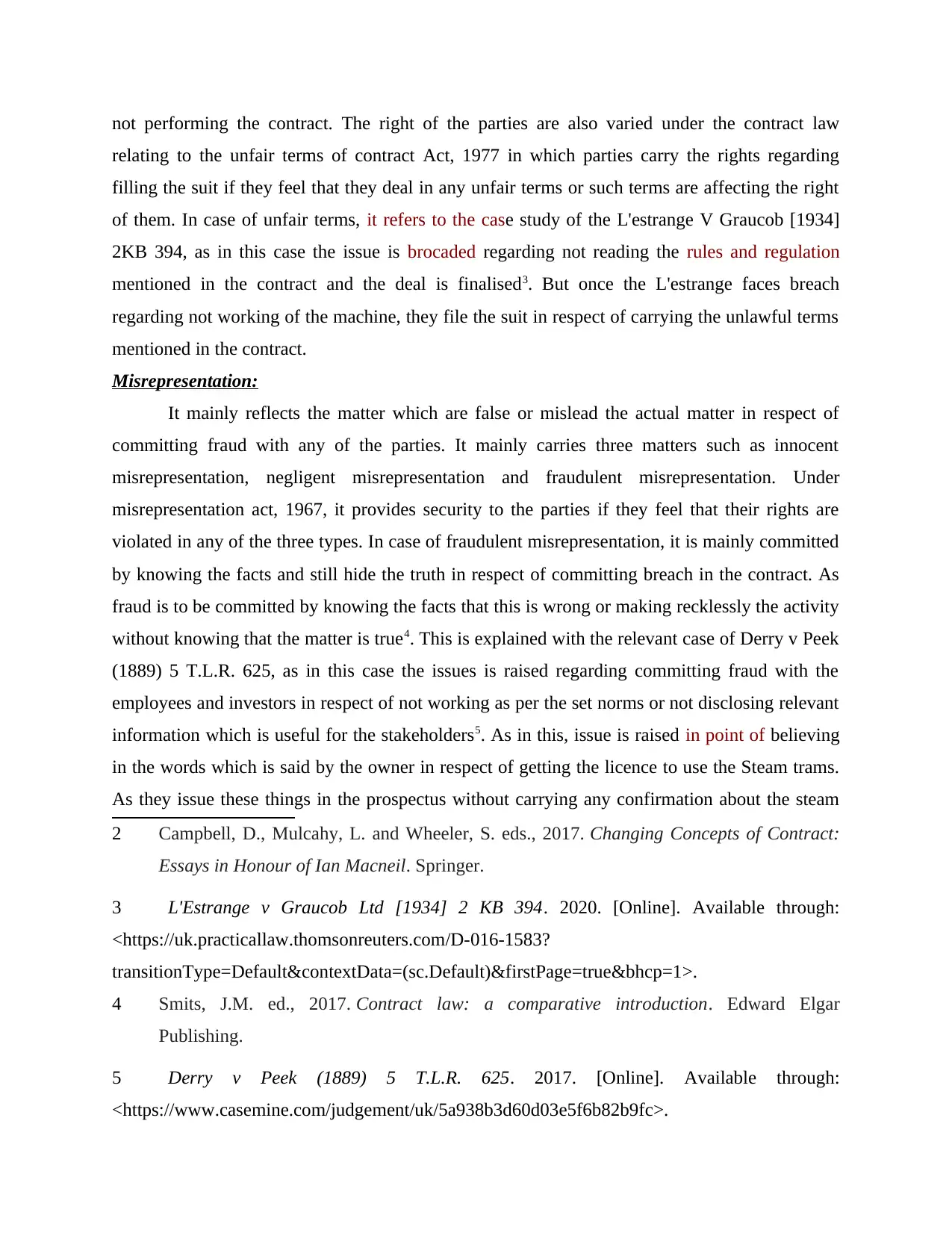
not performing the contract. The right of the parties are also varied under the contract law
relating to the unfair terms of contract Act, 1977 in which parties carry the rights regarding
filling the suit if they feel that they deal in any unfair terms or such terms are affecting the right
of them. In case of unfair terms, it refers to the case study of the L'estrange V Graucob [1934]
2KB 394, as in this case the issue is brocaded regarding not reading the rules and regulation
mentioned in the contract and the deal is finalised3. But once the L'estrange faces breach
regarding not working of the machine, they file the suit in respect of carrying the unlawful terms
mentioned in the contract.
Misrepresentation:
It mainly reflects the matter which are false or mislead the actual matter in respect of
committing fraud with any of the parties. It mainly carries three matters such as innocent
misrepresentation, negligent misrepresentation and fraudulent misrepresentation. Under
misrepresentation act, 1967, it provides security to the parties if they feel that their rights are
violated in any of the three types. In case of fraudulent misrepresentation, it is mainly committed
by knowing the facts and still hide the truth in respect of committing breach in the contract. As
fraud is to be committed by knowing the facts that this is wrong or making recklessly the activity
without knowing that the matter is true4. This is explained with the relevant case of Derry v Peek
(1889) 5 T.L.R. 625, as in this case the issues is raised regarding committing fraud with the
employees and investors in respect of not working as per the set norms or not disclosing relevant
information which is useful for the stakeholders5. As in this, issue is raised in point of believing
in the words which is said by the owner in respect of getting the licence to use the Steam trams.
As they issue these things in the prospectus without carrying any confirmation about the steam
2 Campbell, D., Mulcahy, L. and Wheeler, S. eds., 2017. Changing Concepts of Contract:
Essays in Honour of Ian Macneil. Springer.
3 L'Estrange v Graucob Ltd [1934] 2 KB 394. 2020. [Online]. Available through:
<https://uk.practicallaw.thomsonreuters.com/D-016-1583?
transitionType=Default&contextData=(sc.Default)&firstPage=true&bhcp=1>.
4 Smits, J.M. ed., 2017. Contract law: a comparative introduction. Edward Elgar
Publishing.
5 Derry v Peek (1889) 5 T.L.R. 625. 2017. [Online]. Available through:
<https://www.casemine.com/judgement/uk/5a938b3d60d03e5f6b82b9fc>.
relating to the unfair terms of contract Act, 1977 in which parties carry the rights regarding
filling the suit if they feel that they deal in any unfair terms or such terms are affecting the right
of them. In case of unfair terms, it refers to the case study of the L'estrange V Graucob [1934]
2KB 394, as in this case the issue is brocaded regarding not reading the rules and regulation
mentioned in the contract and the deal is finalised3. But once the L'estrange faces breach
regarding not working of the machine, they file the suit in respect of carrying the unlawful terms
mentioned in the contract.
Misrepresentation:
It mainly reflects the matter which are false or mislead the actual matter in respect of
committing fraud with any of the parties. It mainly carries three matters such as innocent
misrepresentation, negligent misrepresentation and fraudulent misrepresentation. Under
misrepresentation act, 1967, it provides security to the parties if they feel that their rights are
violated in any of the three types. In case of fraudulent misrepresentation, it is mainly committed
by knowing the facts and still hide the truth in respect of committing breach in the contract. As
fraud is to be committed by knowing the facts that this is wrong or making recklessly the activity
without knowing that the matter is true4. This is explained with the relevant case of Derry v Peek
(1889) 5 T.L.R. 625, as in this case the issues is raised regarding committing fraud with the
employees and investors in respect of not working as per the set norms or not disclosing relevant
information which is useful for the stakeholders5. As in this, issue is raised in point of believing
in the words which is said by the owner in respect of getting the licence to use the Steam trams.
As they issue these things in the prospectus without carrying any confirmation about the steam
2 Campbell, D., Mulcahy, L. and Wheeler, S. eds., 2017. Changing Concepts of Contract:
Essays in Honour of Ian Macneil. Springer.
3 L'Estrange v Graucob Ltd [1934] 2 KB 394. 2020. [Online]. Available through:
<https://uk.practicallaw.thomsonreuters.com/D-016-1583?
transitionType=Default&contextData=(sc.Default)&firstPage=true&bhcp=1>.
4 Smits, J.M. ed., 2017. Contract law: a comparative introduction. Edward Elgar
Publishing.
5 Derry v Peek (1889) 5 T.L.R. 625. 2017. [Online]. Available through:
<https://www.casemine.com/judgement/uk/5a938b3d60d03e5f6b82b9fc>.
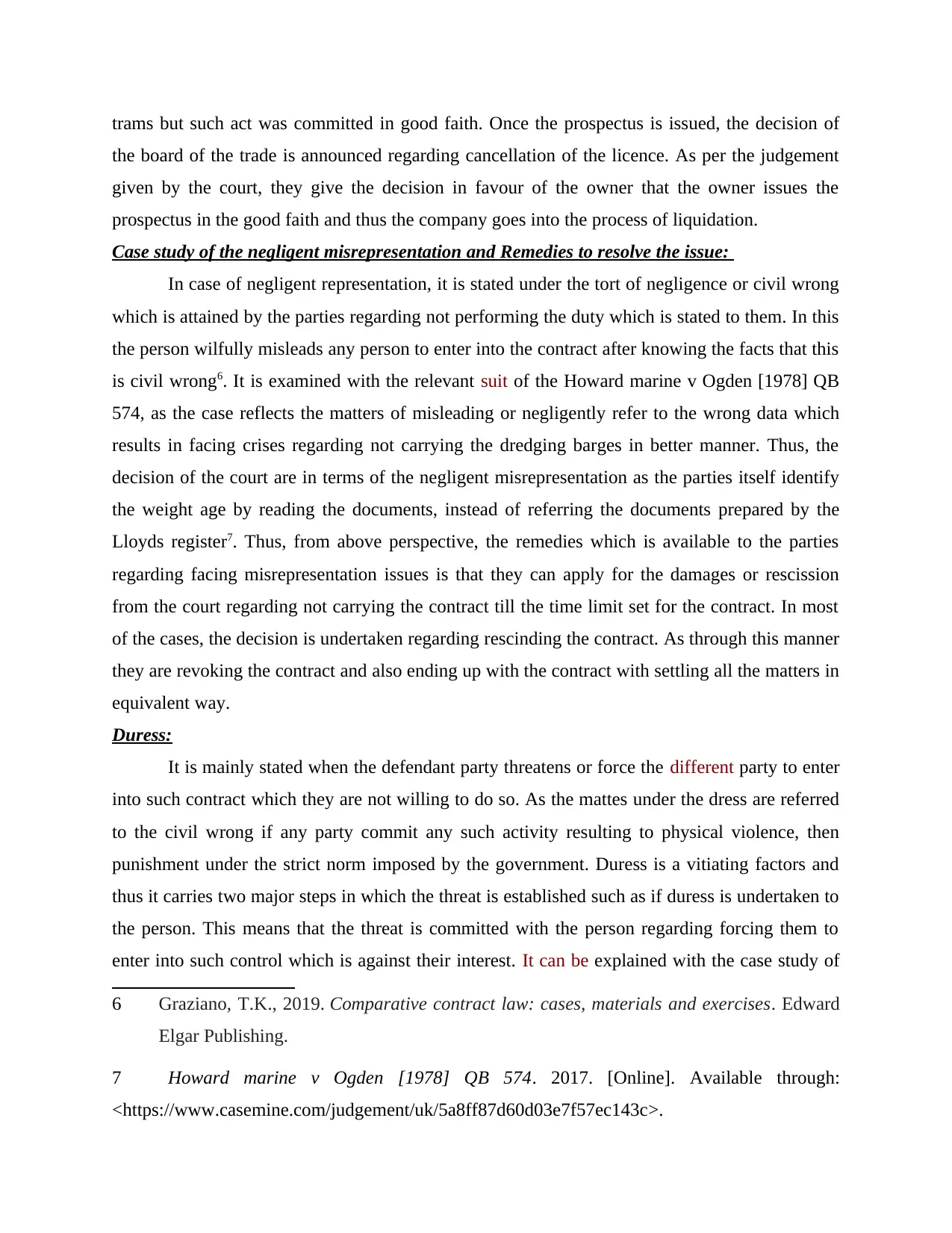
trams but such act was committed in good faith. Once the prospectus is issued, the decision of
the board of the trade is announced regarding cancellation of the licence. As per the judgement
given by the court, they give the decision in favour of the owner that the owner issues the
prospectus in the good faith and thus the company goes into the process of liquidation.
Case study of the negligent misrepresentation and Remedies to resolve the issue:
In case of negligent representation, it is stated under the tort of negligence or civil wrong
which is attained by the parties regarding not performing the duty which is stated to them. In this
the person wilfully misleads any person to enter into the contract after knowing the facts that this
is civil wrong6. It is examined with the relevant suit of the Howard marine v Ogden [1978] QB
574, as the case reflects the matters of misleading or negligently refer to the wrong data which
results in facing crises regarding not carrying the dredging barges in better manner. Thus, the
decision of the court are in terms of the negligent misrepresentation as the parties itself identify
the weight age by reading the documents, instead of referring the documents prepared by the
Lloyds register7. Thus, from above perspective, the remedies which is available to the parties
regarding facing misrepresentation issues is that they can apply for the damages or rescission
from the court regarding not carrying the contract till the time limit set for the contract. In most
of the cases, the decision is undertaken regarding rescinding the contract. As through this manner
they are revoking the contract and also ending up with the contract with settling all the matters in
equivalent way.
Duress:
It is mainly stated when the defendant party threatens or force the different party to enter
into such contract which they are not willing to do so. As the mattes under the dress are referred
to the civil wrong if any party commit any such activity resulting to physical violence, then
punishment under the strict norm imposed by the government. Duress is a vitiating factors and
thus it carries two major steps in which the threat is established such as if duress is undertaken to
the person. This means that the threat is committed with the person regarding forcing them to
enter into such control which is against their interest. It can be explained with the case study of
6 Graziano, T.K., 2019. Comparative contract law: cases, materials and exercises. Edward
Elgar Publishing.
7 Howard marine v Ogden [1978] QB 574. 2017. [Online]. Available through:
<https://www.casemine.com/judgement/uk/5a8ff87d60d03e7f57ec143c>.
the board of the trade is announced regarding cancellation of the licence. As per the judgement
given by the court, they give the decision in favour of the owner that the owner issues the
prospectus in the good faith and thus the company goes into the process of liquidation.
Case study of the negligent misrepresentation and Remedies to resolve the issue:
In case of negligent representation, it is stated under the tort of negligence or civil wrong
which is attained by the parties regarding not performing the duty which is stated to them. In this
the person wilfully misleads any person to enter into the contract after knowing the facts that this
is civil wrong6. It is examined with the relevant suit of the Howard marine v Ogden [1978] QB
574, as the case reflects the matters of misleading or negligently refer to the wrong data which
results in facing crises regarding not carrying the dredging barges in better manner. Thus, the
decision of the court are in terms of the negligent misrepresentation as the parties itself identify
the weight age by reading the documents, instead of referring the documents prepared by the
Lloyds register7. Thus, from above perspective, the remedies which is available to the parties
regarding facing misrepresentation issues is that they can apply for the damages or rescission
from the court regarding not carrying the contract till the time limit set for the contract. In most
of the cases, the decision is undertaken regarding rescinding the contract. As through this manner
they are revoking the contract and also ending up with the contract with settling all the matters in
equivalent way.
Duress:
It is mainly stated when the defendant party threatens or force the different party to enter
into such contract which they are not willing to do so. As the mattes under the dress are referred
to the civil wrong if any party commit any such activity resulting to physical violence, then
punishment under the strict norm imposed by the government. Duress is a vitiating factors and
thus it carries two major steps in which the threat is established such as if duress is undertaken to
the person. This means that the threat is committed with the person regarding forcing them to
enter into such control which is against their interest. It can be explained with the case study of
6 Graziano, T.K., 2019. Comparative contract law: cases, materials and exercises. Edward
Elgar Publishing.
7 Howard marine v Ogden [1978] QB 574. 2017. [Online]. Available through:
<https://www.casemine.com/judgement/uk/5a8ff87d60d03e7f57ec143c>.
⊘ This is a preview!⊘
Do you want full access?
Subscribe today to unlock all pages.

Trusted by 1+ million students worldwide
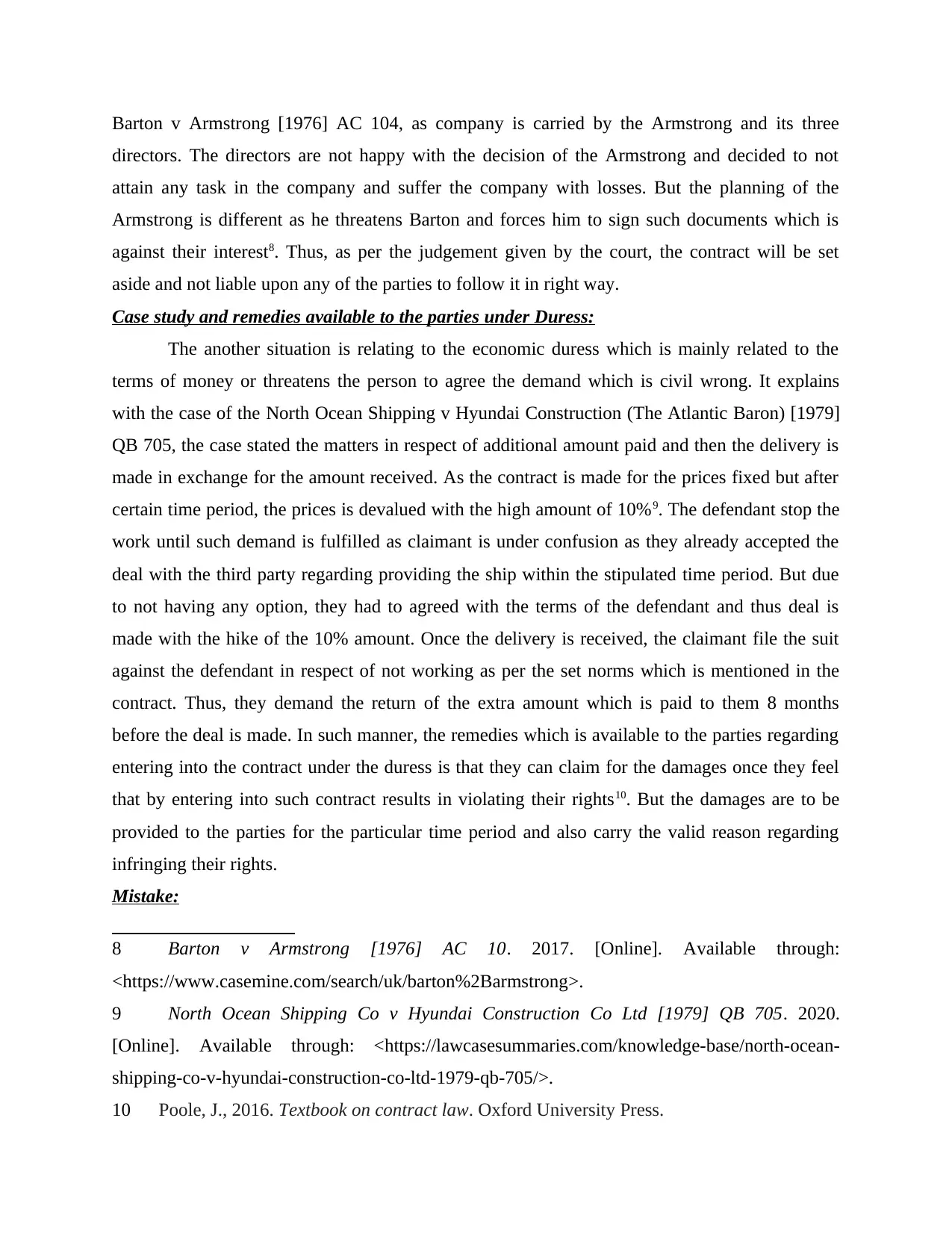
Barton v Armstrong [1976] AC 104, as company is carried by the Armstrong and its three
directors. The directors are not happy with the decision of the Armstrong and decided to not
attain any task in the company and suffer the company with losses. But the planning of the
Armstrong is different as he threatens Barton and forces him to sign such documents which is
against their interest8. Thus, as per the judgement given by the court, the contract will be set
aside and not liable upon any of the parties to follow it in right way.
Case study and remedies available to the parties under Duress:
The another situation is relating to the economic duress which is mainly related to the
terms of money or threatens the person to agree the demand which is civil wrong. It explains
with the case of the North Ocean Shipping v Hyundai Construction (The Atlantic Baron) [1979]
QB 705, the case stated the matters in respect of additional amount paid and then the delivery is
made in exchange for the amount received. As the contract is made for the prices fixed but after
certain time period, the prices is devalued with the high amount of 10%9. The defendant stop the
work until such demand is fulfilled as claimant is under confusion as they already accepted the
deal with the third party regarding providing the ship within the stipulated time period. But due
to not having any option, they had to agreed with the terms of the defendant and thus deal is
made with the hike of the 10% amount. Once the delivery is received, the claimant file the suit
against the defendant in respect of not working as per the set norms which is mentioned in the
contract. Thus, they demand the return of the extra amount which is paid to them 8 months
before the deal is made. In such manner, the remedies which is available to the parties regarding
entering into the contract under the duress is that they can claim for the damages once they feel
that by entering into such contract results in violating their rights10. But the damages are to be
provided to the parties for the particular time period and also carry the valid reason regarding
infringing their rights.
Mistake:
8 Barton v Armstrong [1976] AC 10. 2017. [Online]. Available through:
<https://www.casemine.com/search/uk/barton%2Barmstrong>.
9 North Ocean Shipping Co v Hyundai Construction Co Ltd [1979] QB 705. 2020.
[Online]. Available through: <https://lawcasesummaries.com/knowledge-base/north-ocean-
shipping-co-v-hyundai-construction-co-ltd-1979-qb-705/>.
10 Poole, J., 2016. Textbook on contract law. Oxford University Press.
directors. The directors are not happy with the decision of the Armstrong and decided to not
attain any task in the company and suffer the company with losses. But the planning of the
Armstrong is different as he threatens Barton and forces him to sign such documents which is
against their interest8. Thus, as per the judgement given by the court, the contract will be set
aside and not liable upon any of the parties to follow it in right way.
Case study and remedies available to the parties under Duress:
The another situation is relating to the economic duress which is mainly related to the
terms of money or threatens the person to agree the demand which is civil wrong. It explains
with the case of the North Ocean Shipping v Hyundai Construction (The Atlantic Baron) [1979]
QB 705, the case stated the matters in respect of additional amount paid and then the delivery is
made in exchange for the amount received. As the contract is made for the prices fixed but after
certain time period, the prices is devalued with the high amount of 10%9. The defendant stop the
work until such demand is fulfilled as claimant is under confusion as they already accepted the
deal with the third party regarding providing the ship within the stipulated time period. But due
to not having any option, they had to agreed with the terms of the defendant and thus deal is
made with the hike of the 10% amount. Once the delivery is received, the claimant file the suit
against the defendant in respect of not working as per the set norms which is mentioned in the
contract. Thus, they demand the return of the extra amount which is paid to them 8 months
before the deal is made. In such manner, the remedies which is available to the parties regarding
entering into the contract under the duress is that they can claim for the damages once they feel
that by entering into such contract results in violating their rights10. But the damages are to be
provided to the parties for the particular time period and also carry the valid reason regarding
infringing their rights.
Mistake:
8 Barton v Armstrong [1976] AC 10. 2017. [Online]. Available through:
<https://www.casemine.com/search/uk/barton%2Barmstrong>.
9 North Ocean Shipping Co v Hyundai Construction Co Ltd [1979] QB 705. 2020.
[Online]. Available through: <https://lawcasesummaries.com/knowledge-base/north-ocean-
shipping-co-v-hyundai-construction-co-ltd-1979-qb-705/>.
10 Poole, J., 2016. Textbook on contract law. Oxford University Press.
Paraphrase This Document
Need a fresh take? Get an instant paraphrase of this document with our AI Paraphraser
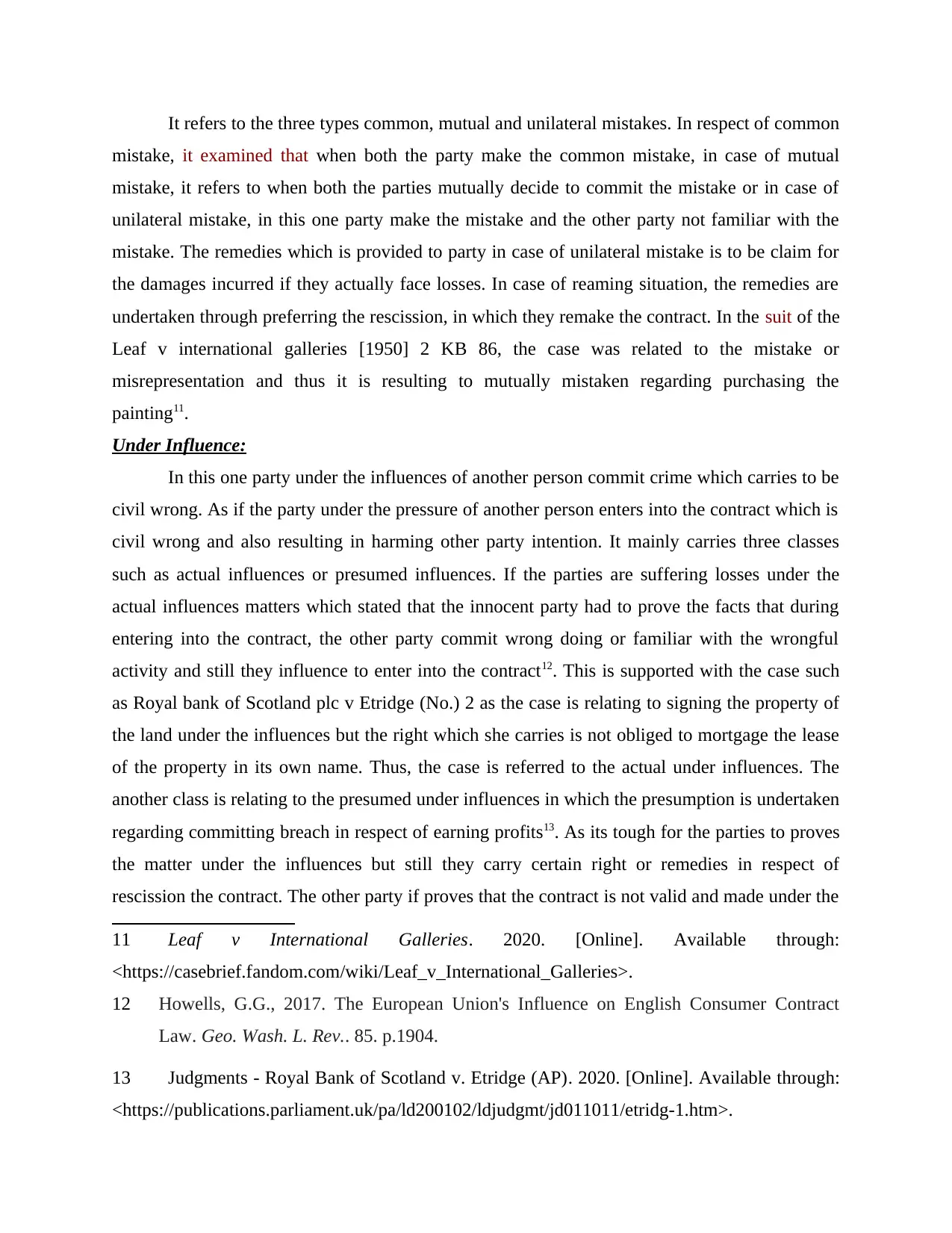
It refers to the three types common, mutual and unilateral mistakes. In respect of common
mistake, it examined that when both the party make the common mistake, in case of mutual
mistake, it refers to when both the parties mutually decide to commit the mistake or in case of
unilateral mistake, in this one party make the mistake and the other party not familiar with the
mistake. The remedies which is provided to party in case of unilateral mistake is to be claim for
the damages incurred if they actually face losses. In case of reaming situation, the remedies are
undertaken through preferring the rescission, in which they remake the contract. In the suit of the
Leaf v international galleries [1950] 2 KB 86, the case was related to the mistake or
misrepresentation and thus it is resulting to mutually mistaken regarding purchasing the
painting11.
Under Influence:
In this one party under the influences of another person commit crime which carries to be
civil wrong. As if the party under the pressure of another person enters into the contract which is
civil wrong and also resulting in harming other party intention. It mainly carries three classes
such as actual influences or presumed influences. If the parties are suffering losses under the
actual influences matters which stated that the innocent party had to prove the facts that during
entering into the contract, the other party commit wrong doing or familiar with the wrongful
activity and still they influence to enter into the contract12. This is supported with the case such
as Royal bank of Scotland plc v Etridge (No.) 2 as the case is relating to signing the property of
the land under the influences but the right which she carries is not obliged to mortgage the lease
of the property in its own name. Thus, the case is referred to the actual under influences. The
another class is relating to the presumed under influences in which the presumption is undertaken
regarding committing breach in respect of earning profits13. As its tough for the parties to proves
the matter under the influences but still they carry certain right or remedies in respect of
rescission the contract. The other party if proves that the contract is not valid and made under the
11 Leaf v International Galleries. 2020. [Online]. Available through:
<https://casebrief.fandom.com/wiki/Leaf_v_International_Galleries>.
12 Howells, G.G., 2017. The European Union's Influence on English Consumer Contract
Law. Geo. Wash. L. Rev.. 85. p.1904.
13 Judgments - Royal Bank of Scotland v. Etridge (AP). 2020. [Online]. Available through:
<https://publications.parliament.uk/pa/ld200102/ldjudgmt/jd011011/etridg-1.htm>.
mistake, it examined that when both the party make the common mistake, in case of mutual
mistake, it refers to when both the parties mutually decide to commit the mistake or in case of
unilateral mistake, in this one party make the mistake and the other party not familiar with the
mistake. The remedies which is provided to party in case of unilateral mistake is to be claim for
the damages incurred if they actually face losses. In case of reaming situation, the remedies are
undertaken through preferring the rescission, in which they remake the contract. In the suit of the
Leaf v international galleries [1950] 2 KB 86, the case was related to the mistake or
misrepresentation and thus it is resulting to mutually mistaken regarding purchasing the
painting11.
Under Influence:
In this one party under the influences of another person commit crime which carries to be
civil wrong. As if the party under the pressure of another person enters into the contract which is
civil wrong and also resulting in harming other party intention. It mainly carries three classes
such as actual influences or presumed influences. If the parties are suffering losses under the
actual influences matters which stated that the innocent party had to prove the facts that during
entering into the contract, the other party commit wrong doing or familiar with the wrongful
activity and still they influence to enter into the contract12. This is supported with the case such
as Royal bank of Scotland plc v Etridge (No.) 2 as the case is relating to signing the property of
the land under the influences but the right which she carries is not obliged to mortgage the lease
of the property in its own name. Thus, the case is referred to the actual under influences. The
another class is relating to the presumed under influences in which the presumption is undertaken
regarding committing breach in respect of earning profits13. As its tough for the parties to proves
the matter under the influences but still they carry certain right or remedies in respect of
rescission the contract. The other party if proves that the contract is not valid and made under the
11 Leaf v International Galleries. 2020. [Online]. Available through:
<https://casebrief.fandom.com/wiki/Leaf_v_International_Galleries>.
12 Howells, G.G., 2017. The European Union's Influence on English Consumer Contract
Law. Geo. Wash. L. Rev.. 85. p.1904.
13 Judgments - Royal Bank of Scotland v. Etridge (AP). 2020. [Online]. Available through:
<https://publications.parliament.uk/pa/ld200102/ldjudgmt/jd011011/etridg-1.htm>.
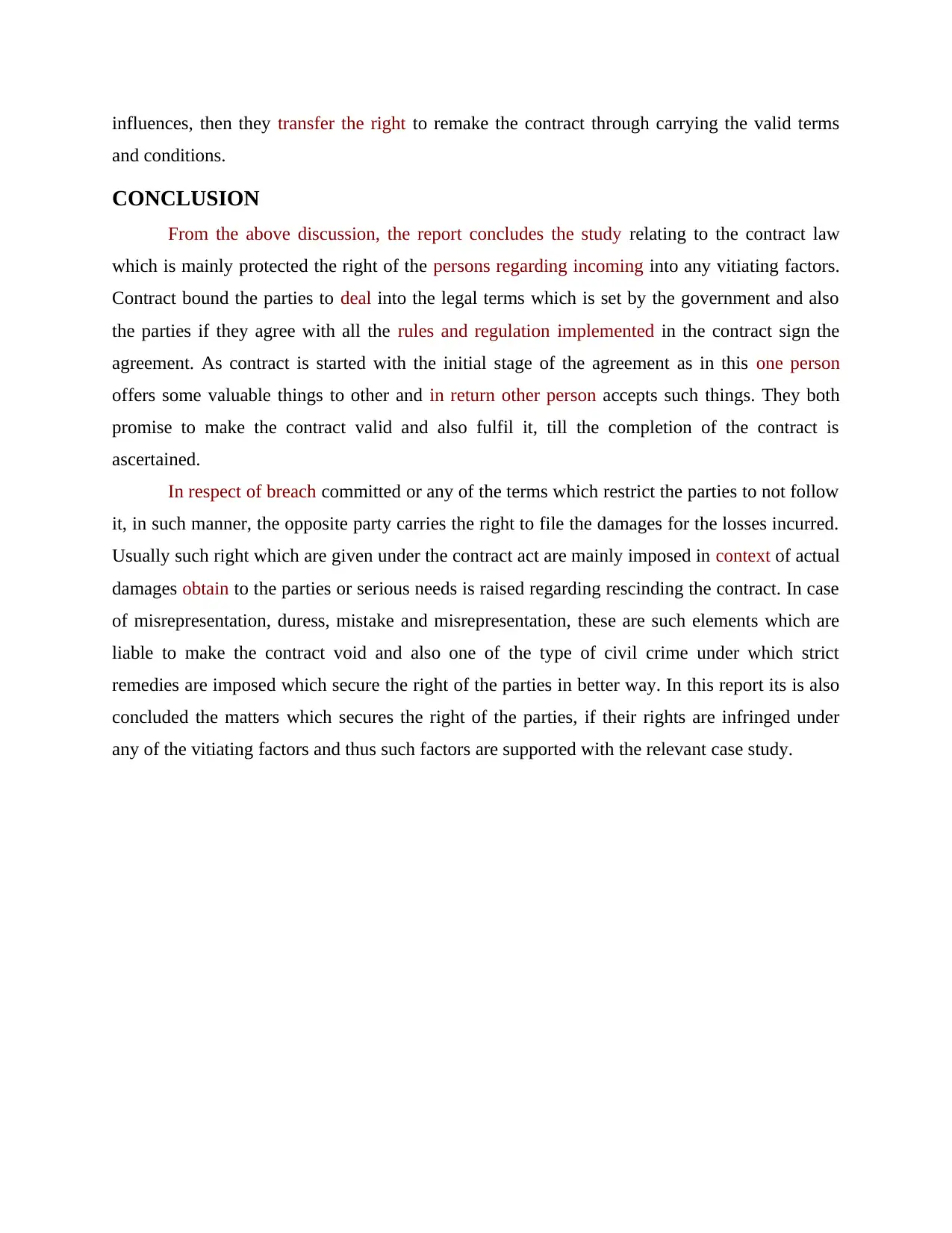
influences, then they transfer the right to remake the contract through carrying the valid terms
and conditions.
CONCLUSION
From the above discussion, the report concludes the study relating to the contract law
which is mainly protected the right of the persons regarding incoming into any vitiating factors.
Contract bound the parties to deal into the legal terms which is set by the government and also
the parties if they agree with all the rules and regulation implemented in the contract sign the
agreement. As contract is started with the initial stage of the agreement as in this one person
offers some valuable things to other and in return other person accepts such things. They both
promise to make the contract valid and also fulfil it, till the completion of the contract is
ascertained.
In respect of breach committed or any of the terms which restrict the parties to not follow
it, in such manner, the opposite party carries the right to file the damages for the losses incurred.
Usually such right which are given under the contract act are mainly imposed in context of actual
damages obtain to the parties or serious needs is raised regarding rescinding the contract. In case
of misrepresentation, duress, mistake and misrepresentation, these are such elements which are
liable to make the contract void and also one of the type of civil crime under which strict
remedies are imposed which secure the right of the parties in better way. In this report its is also
concluded the matters which secures the right of the parties, if their rights are infringed under
any of the vitiating factors and thus such factors are supported with the relevant case study.
and conditions.
CONCLUSION
From the above discussion, the report concludes the study relating to the contract law
which is mainly protected the right of the persons regarding incoming into any vitiating factors.
Contract bound the parties to deal into the legal terms which is set by the government and also
the parties if they agree with all the rules and regulation implemented in the contract sign the
agreement. As contract is started with the initial stage of the agreement as in this one person
offers some valuable things to other and in return other person accepts such things. They both
promise to make the contract valid and also fulfil it, till the completion of the contract is
ascertained.
In respect of breach committed or any of the terms which restrict the parties to not follow
it, in such manner, the opposite party carries the right to file the damages for the losses incurred.
Usually such right which are given under the contract act are mainly imposed in context of actual
damages obtain to the parties or serious needs is raised regarding rescinding the contract. In case
of misrepresentation, duress, mistake and misrepresentation, these are such elements which are
liable to make the contract void and also one of the type of civil crime under which strict
remedies are imposed which secure the right of the parties in better way. In this report its is also
concluded the matters which secures the right of the parties, if their rights are infringed under
any of the vitiating factors and thus such factors are supported with the relevant case study.
⊘ This is a preview!⊘
Do you want full access?
Subscribe today to unlock all pages.

Trusted by 1+ million students worldwide
1 out of 9
Related Documents
Your All-in-One AI-Powered Toolkit for Academic Success.
+13062052269
info@desklib.com
Available 24*7 on WhatsApp / Email
![[object Object]](/_next/static/media/star-bottom.7253800d.svg)
Unlock your academic potential
Copyright © 2020–2026 A2Z Services. All Rights Reserved. Developed and managed by ZUCOL.




